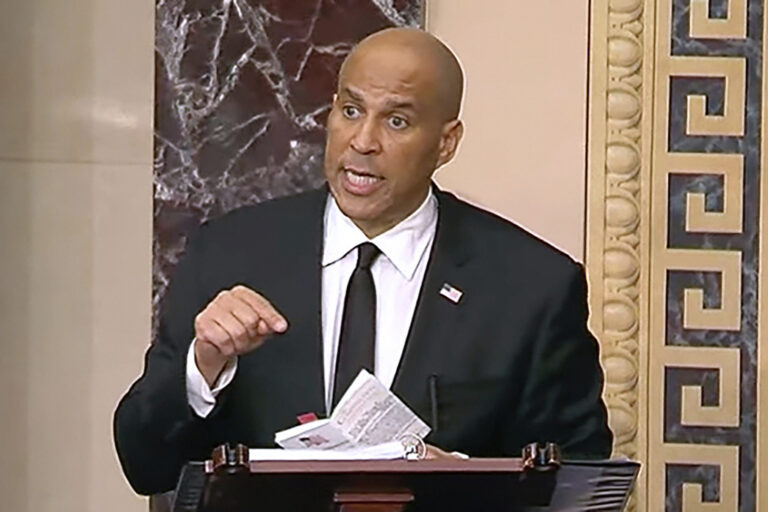 The night before Donald Trump’s inauguration, five environmental lawyers filed a federal court brief defending an Obama administration clean-water rule that the new president and his Republican allies have targeted for elimination, considering it burdensome to landowners.
The night before Donald Trump’s inauguration, five environmental lawyers filed a federal court brief defending an Obama administration clean-water rule that the new president and his Republican allies have targeted for elimination, considering it burdensome to landowners.
The move served as a warning that environmentalists, facing a hostile administration and a Republican-dominated Congress, are prepared to battle in court against what they fear will be a wave of unfavorable policies concerning climate change, wildlife protection, federal lands and pollution.
Advocacy groups nationwide are hiring more staff lawyers. They’re coordinating with private attorneys and firms that have volunteered to help. They’re reviewing statutes, setting priorities and seeking donations.
“It’s going to be all-out war,” said Vermont Law School Professor Patrick Parenteau. “If you’re an environmentalist or conservationist, this is indeed a scary time.”
Trump’s first week in office only heightened their anxieties. He moved to resume construction of the Keystone XL and Dakota Access pipelines that the Obama administration had halted, while signaling intentions to abandon his predecessor’s fight against global warming, vastly expand oil and gas drilling on public lands and slash the Environmental Protection Agency’s budget.
GOP lawmakers, meanwhile, introduced measures to overturn a new Interior Department rule barring coal mining companies from damaging streams and to remove some wolves from the endangered species list.
“They’ve wasted no time in doing bad things,” said Pat Gallagher, director of the Sierra Club’s 50-member legal team, which he said is likely to grow as environmentalists increasingly regard the courts as their best option, even though success there is far from certain.
The Department of Justice, which represents the federal government in environmental lawsuits, declined to comment, while the White House did not respond to emails seeking comment. Doug Ericksen, communications director for Trump’s transition team at EPA, said of the environmentalists that he’s “not sure what they think they’re preparing for” but suspects they are stoking fear of Trump as a fundraising tool.
“They’re more concerned about raising money than protecting the environment,” Ericksen said.
Jim Burling, litigation director for the Pacific Legal Foundation, a nonprofit property rights group that sues regulators on behalf of businesses and landowners, also contended environmental groups were exaggerating the Trump administration’s threat for political and financial gain.
The government bureaucracy is entrenched, Burling said, and, “who happens to occupy the White House hasn’t made that much difference.”
Environmentalists say their fears are justified by the new administration’s antagonism toward government’s role in keeping air and water clean and the planet from overheating.
Donations began increasing after Trump’s election, “even before the fundraising letters were sent” asking for support to fight the administration’s actions, said David Goldston, government affairs director at the Natural Resources Defense Council.
Earthjustice, which has represented the Standing Rock Sioux tribe in its fight against the Dakota Access Pipeline, has about 100 staff attorneys and plans to bring more aboard, said Tim Preso, who manages the group’s Northern Rockies office.
The Chicago-based Environmental Law & Policy Center is adding four attorneys to its pre-election staff of 18 and is coordinating with more than a dozen outside attorneys who would file citizen suits against polluters for free if agencies fail to enforce existing rules, said Executive Director Howard Learner.
“We cannot fully substitute and replace the EPA doing its job,” Learner said. “But on the other hand, we’re not going to default to zero if the EPA steps backward when it comes to clean air and clean water enforcement.”
On inauguration eve, five law professors filed a brief in support of a 2015 regulation giving EPA and the Army Corps of Engineers discretion to regulate tributaries and wetlands far upstream from navigable lakes and rivers to protect water quality.
Dozens of states have sued to block the rule — including Oklahoma, led by state Attorney General Scott Pruitt, now Trump’s choice for EPA administrator — saying it gives government too much power over private property.
Shortly after Trump took office, his White House webpage listed the rule among “harmful and unnecessary policies” he would target.
“If the Trump administration won’t defend the rule, I want to stand alongside environmental groups and do what I can to defend (it),” said David Uhlmann, a University of Michigan law professor and former Justice Department prosecutor, who helped file the brief.
Going to court is just one tactic environmental lawyers will use, said Erik Schlenker-Goodrich of the Oregon-based Western Environmental Law Center, which also plans new hires. They will monitor agencies for failure to enforce pollution law or cutting corners when writing permits for activities such as oil and gas drilling, he said.
The Sierra Club’s Gallagher, who sued over oil drilling beneath national parks during the George W. Bush administration, said another tactic would be making liberal use of open-records laws to obtain scientific data and other materials that might otherwise be purged. The group already has requested records on climate change from the EPA.
“We’re not surprised at what they’re doing, but maybe a little surprised at how fast and furious it’s all happening,” Gallagher said. “But we were bracing for it and we’re ready.”
(AP)










